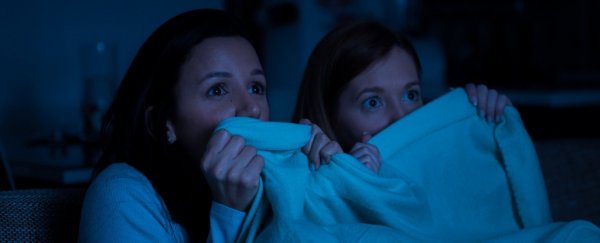Pandemic movies don't just immerse you in a crisis, they might actually prepare you for one.
New research suggests post-apocalyptic movies, or 'prepper' films, may give fans a practical and mental advantage in the current coronavirus pandemic.
"If it's a good movie, it pulls you in and you take the perspective of the characters, so you are unintentionally rehearsing the scenarios," Coltan Scrivner, a psychologist who specialises in morbid curiosity at the University of Chicago, told The Guardian.
"We think people are learning vicariously. It's like, with the exception of the toilet paper shortage, they pretty much knew what to buy."
The authors of the preprint study – which has not yet been peer-reviewed – say that books and movies are a "gift from natural selection", because they help us navigate real world situations through fiction.
While the world isn't about to be invaded by aliens or zombies any time soon, these imaginary narratives could give us the mental opportunity to play out dangerous social upheaval, all while sitting in comfort and safety.
But does that really translate to the real world? To find out, researchers asked 310 volunteers what movies they preferred, how prepared they felt going into the pandemic, and whether they'd experienced any levels of anxiety, depression, irritability, or sleeplessness since.
The idea was to test whether horror or pandemic films, somehow relevant to the current crisis, had prepared viewers any better. And it turns out, they kind of had.
"We found that fans of horror films exhibited greater resilience during the pandemic and that fans of 'prepper' genres (alien-invasion, apocalyptic, and zombie films) exhibited both greater resilience and preparedness," the authors conclude.
When the actual pandemic hit, those with a sense of morbid curiosity were driven to films like Contagion, and they also exhibited greater resilience during this crisis.
Even when psychologists controlled for age, sex, affinity for movies, and other personality traits, like neuroticism and conscientiousness, they found evidence to suggest these frightening imaginary events were helping some of us cope better.
By delving into the fictional world of prepper movies, we are absorbing information on how people act in the face of a pandemic, whether knowingly or not, and some psychologists think that information could be valuable in the real world.
It could, for instance, tell a person what kind of social conflicts are likely to arise amid chaos, which institutions we can truly rely on, and what the world might look like if people act selfishly or cooperatively - stuff the average person usually doesn't consider of their own volition.
In the early weeks of the COVID-19 pandemic, there was a massive surge in people watching the film Contagion. Far from being a form of escapism, this decade-old film is a realistic depiction of what could happen during a viral pandemic. So it might be morbid curiosity that's driving us to watch such films.
"Through a greater propensity to gather information about dangerous phenomena, morbidly curious individuals may accrue a larger repertoire of knowledge and coping strategies that would be useful in a variety of dangerous situations in real life," the authors of the new study write.
Still, we might be jumping to conclusions. While the study focuses on morbid curiosity, watching movies like Contagion at a time like this could also be a type of sensation-seeking behaviour, which is tied to a desire for greater arousal and an enjoyment of horror media.
In the study, being a horror fan was not related to greater resilience or preparedness, but horror fandom was linked to lower psychological distress.
Fans of the prepper genre, on the other hand, were more prepared for the pandemic and experienced fewer negative disruptions in their life during the pandemic.
Among those who were not deemed morbidly curious, however, there were mixed results for psychological resiliency. The authors think this is because many pandemic films are meant to scare people rather than inspire curiosity or approach the pandemic "as an intrinsically interesting phenomenon".
So whilst fans of prepper films appear more prepared, they could also be far more vigilant or frightened, and this can have mental repercussions in the long-term.
"Our findings add support to the idea that fiction can be a useful simulation of both specific scenarios - in the case of pandemic films - and generally fearful scenarios -in the case of horror films," the authors conclude.
"Experience with these simulations can be used as a form of preparation and practice of both specific skills relevant to particular situations and more general skills associated with emotion regulation."
We hope they're right.
The preprint paper was published in PsyArXiv.
